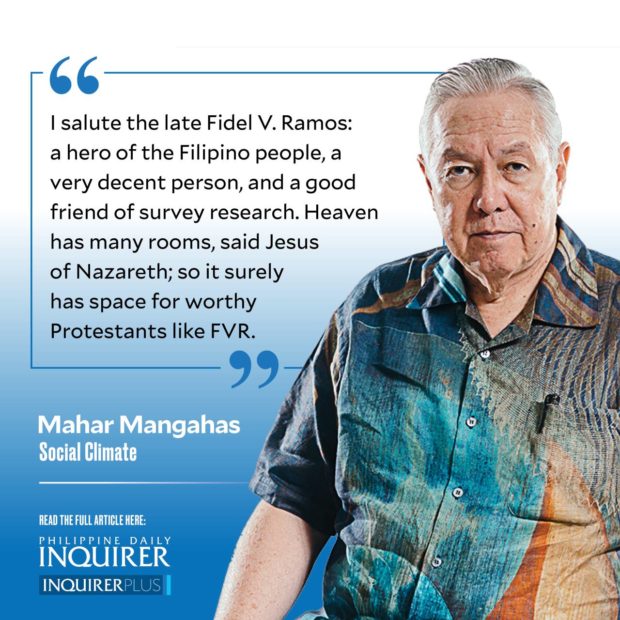I salute the late Fidel V. Ramos: a hero of the Filipino people, a very decent person, and a good friend of survey research. Heaven has many rooms, said Jesus of Nazareth; so it surely has space for worthy Protestants like FVR.
The 1986-1992 surveys. In the time of President Cory Aquino, the military-coup attempts against her were very unpopular. Cory’s popularity, and of course also that of FVR, was much enhanced by their defeat, whereas the ratings of Doy Laurel, Johnny Ponce Enrile, and Gringo Honasan went negative.
Most Filipinos favored the stay of the US military bases, and so were surprised that the Senate said No to their extension. But when the actual departure of the bases in 1991 proved harmless to the economy, the Filipino people changed their minds, and agreed with the Senate (see my “The Philippine Social Climate: From the SWS Surveys,” Anvil, 1994).
In four SWS pre-election surveys from July 1991 to April 1992, FVR either led or was tied for No.1. My final pre-election column in the Manila Chronicle, “Ramos, Miriam in a close fight” (5/9/92), had him at 17.6 percent versus Miriam Defensor-Santiago at 16.4 percent, with 34 percent still undecided. The undecideds were relatively older, poorer, less educated, and more rural, which I said favored FVR.
Prior to the May 1992 election, SWS did surveys in FVR’s behalf, and presented them to Ramon R. del Rosario, Jose T. Almonte (“JoAl”) and others, but not to FVR himself. (All SWS surveys, including commissioned ones, are open to public research, after a maximum three-year embargo period. We call on Ambeth Ocampo—an SWS Fellow, by the way—and other historians, to use the SWS archives.)
The 1992-98 SWS surveys. Our link to FVR as president was Almonte, his national security adviser, through whom FVR often invited us to brief the Cabinet on the latest findings, invariably recommending that they become our subscribers.
At one Cabinet meeting, in 1994 I think, FVR observed that the outstanding rating of health secretary Juan Flavier merited putting him into the 1995 Senate race (where Flavier won easily). In 1995, FVR’s popularity suffered twice: first by the Flor Contemplacion tragedy in March, and then by the rice price crisis in August; but it recovered later.
There never was a popular call for amending the Constitution. Those in favor had the mistaken idea that it could suppress inflation and fight against government corruption. Most Filipinos wanted (and I think still want now) to keep the fixed-term, presidential form of government, rather than shift to the variable-term, parliamentary form of government instead.
FVR requested an SWS poll in Masinloc, Zambales, to check on reported opposition, led by the parish priest and local officials, to the construction of a coal-fired power plant there. We did the fieldwork very quickly, without alerting the community, and found it was true. FVR listened to our findings and decided to take a personal hand in the matter by going to Masinloc himself. What he promised there I don’t know, but he was able to reverse public opinion. Historians are welcome to see the Masinloc poll; its embargo expired long ago.
In January 1998, the annual meeting of the International Social Survey Program (issp.org) was held in Manila and hosted by SWS (an ISSP member since 1990). One afternoon, the delegates, from two dozen countries, toured Malacañang, and met FVR afterwards.
FVR took out a paper from his pocket, threw it away, spoke ex tempo for five minutes, and then asked, with a big smile, if there were any questions; the visitors were speechless. (JoAl said he’d arrange the visit if I wrote FVR’s speech, but didn’t warn me of FVR’s habit of tossing off speeches.)
After his presidency, I still got to see FVR. He graciously came to the SWS 20th and 25th anniversary affairs in 2005 and 2010. I was a regular guest at the small dinners of mutual friend Scott Thompson, where FVR came with JoAl, Jose “Jomag” Magno, Frankie Sionil Jose, and others. (See “Democracy and Discipline: Fidel V. Ramos and His Philippine Presidency,” by W. Scott Thompson and Federico M. Macaranas, UST Publishing House, 2006, and “Trustee of the Nation: The Biography of Fidel V. Ramos,” by W. Scott Thompson, Anvil, 2011. Scott Thompson [1942-2017], political scientist, had been an active SWS Fellow when he died from a sudden heart attack at his home at Lake Talisay.)
——————
Contact: mahar.mangahas@sws.org.ph


